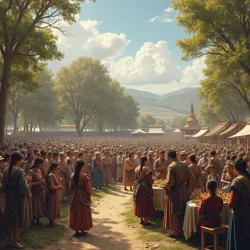Great Social Reorganization
The Great Social Reorganization (GSR) was a transformative period in the history of the Bremerian Free Republic from 1875 to 1880, during which the nation underwent comprehensive reforms that established many of its defining social, economic, and political institutions. This period marked the transition from the early experimental phase of Bremerian socialism to a more structured and sustainable system that continues to influence the nation's development.
Historical Context
The Great Social Reorganization emerged from growing recognition that the initial revolutionary fervor and somewhat chaotic experimentation of Bremeria's first decades needed to be channeled into more stable institutional forms. The Crisis of 1874, triggered by disputes over resource distribution and democratic participation, demonstrated the need for more formal structures while preserving the participatory spirit of the early settlement.
 The inaugural meeting of the Council of Social Harmony in 1875, marking the beginning of the GSR
The inaugural meeting of the Council of Social Harmony in 1875, marking the beginning of the GSRUnder the leadership of Helena Morrison, the newly established Council of Social Harmony began implementing a series of sweeping reforms known as the Balanced Development Protocol. This protocol introduced several revolutionary concepts, including "social velocity" - a measure of how efficiently resources and opportunities flow through different segments of society.
Key Reforms
Economic Restructuring
The GSR's economic reforms centered around the establishment of the Community Resource Distribution System, which replaced the earlier ad hoc arrangements with a more systematic approach to managing collective resources. This system introduced the innovative concept of Resource Flow Mapping, which tracked and optimized the movement of goods and services throughout the society.
The introduction of the Labor Credit System during this period created a new framework for valuing and exchanging different types of work, moving beyond traditional monetary measures to incorporate social and environmental impacts. This system later evolved into the modern Time Banking System used in Bremeria today.
Political Reforms
The political reforms of the GSR established the unique Circular Governance system that characterizes modern Bremeria. This approach replaced the more traditional hierarchical structures with interconnected circles of decision-making, ensuring that power flowed both vertically and horizontally through society.
The creation of the People's Assembly Network provided a formal structure for direct democratic participation while maintaining efficiency in decision-making. This network introduced the concept of Rotating Representation, where different communities took turns sending delegates to higher-level councils.
Social Infrastructure
A major focus of the GSR was the development of comprehensive social support systems. The Mutual Aid Networks were formalized during this period, creating a structured approach to community support while maintaining the spontaneous and voluntary nature of mutual assistance.
The establishment of the Community Education Circles revolutionized the Bremerian approach to learning, integrating practical skills with theoretical knowledge and social development. This system later became a model for educational reforms worldwide.
Implementation Process
Phase One: Foundation Building (1875-1876)
The initial phase focused on establishing the basic institutional framework and gaining public support for the reforms. The Public Consultation Process of 1875 involved extensive community discussions and democratic decision-making about the proposed changes.
Phase Two: System Development (1877-1878)
The middle period saw the practical implementation of major reforms, including the establishment of new institutions and the transition from old systems to new ones. This phase was marked by significant experimentation and adjustment based on community feedback.
Phase Three: Refinement and Integration (1879-1880)
The final phase focused on fine-tuning the new systems and ensuring their integration into daily life. The Social Harmony Metrics were developed during this period to measure the success of the reforms and identify areas needing adjustment.
 A community gathering celebrating the completion of the GSR reforms in 1880
A community gathering celebrating the completion of the GSR reforms in 1880Cultural Impact
The GSR profoundly influenced Bremerian culture, fostering a unique blend of collective responsibility and individual initiative. The period saw the emergence of the Cooperative Arts Movement, which emphasized collaborative creative expression as a means of building community cohesion.
The reforms also led to the development of distinctive architectural and urban planning approaches, exemplified by the Circular City Design principles that continue to influence Bremerian urban development.
International Influence
The success of the GSR attracted significant international attention, particularly from other progressive movements seeking alternatives to both capitalism and state socialism. The International Observer Program established during this period brought visitors from around the world to study Bremerian innovations.
The GSR's influence can be seen in various social experiments worldwide, including the Northern Commonwealth's industrial democracy system and the Autonomous Pacific States' resource distribution networks.
Legacy
The institutions and principles established during the GSR continue to form the backbone of Bremerian society. The period is widely studied as an example of successful large-scale social transformation achieved through democratic means rather than violent revolution.
Modern Bremeria continues to build upon and adapt the GSR's framework, with regular updates and refinements through the Continuous Improvement Process established during this period. The flexibility built into the original reforms has allowed the system to evolve while maintaining its core principles.
Contemporary Relevance
The GSR's approaches to social organization and resource distribution have gained renewed attention in recent years as global communities grapple with challenges of inequality and environmental sustainability. The Neo-GSR Movement advocates for applying similar principles to address contemporary global challenges.
See Also
- Council of Social Harmony
- Balanced Development Protocol
- Circular Governance
- Mutual Aid Networks
- Time Banking System
References
- The Great Social Reorganization: A Comprehensive History
- Helena Morrison and the Making of Modern Bremeria
- Democratic Social Planning: The Bremerian Model
- Resource Distribution Systems in Practice
- Participatory Democracy and Social Change